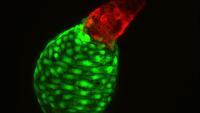Labs and Teams
-
The Bogunovic lab focuses on the study of human immunogenetics. We aim to improve understanding of the human immune system.
-
The Edwards team focuses on children with medical complexity, how critical illness impacts these patients, how they impact pediatric ICUs, and improving their patient- and family-centered outcomes.
-
The Egli Lab studies human development using the earliest cell types, from the fertilized egg to a fully functional and differentiated cell type, such as a beta cell that produces insulin.
-
Research at the Leibel Lab is focused on the molecular genetics and physiology of weight regulation and diabetes.
-
Research in the Lin Lab is focused on understanding the pathogenesis of acute kidney injury (AKI) and the transition of AKI to chronic kidney disease (CKD).
-
Members of the Lovinsky-Desir Research team focus on understanding and addressing factors in the urban environment that contribute to pediatric asthma.
-
Research in the Mace Lab is focused on understanding the molecular signaling that drives human NK cell development and how this is dysregulated in cases of human disease.
-
The Maegawa Lab focuses on developing therapies for lysosomal storage diseases (LSDs) based on critical pathogenic mechanisms underlying the neurological manifestations of these disorders.
-
The Milner Lab researches the genetics and immunopathology of inborn disorders of the immune system, with the goal of identifying pathways relevant for diagnosis and treatment.
-
The Moscona Lab is focused on understanding how enveloped viruses enter cells, and on using this understanding to prevent viral infection.
-
The Prince Lab studies the interaction of the host and bacterial pathogens in both the airway and skin.
-
Dr. Riquelme's lab studies how metabolism regulates host-pathogen interaction. They are learning how specific metabolic routes define the bactericidal function of immune cells during pneumonia.
-
The Sadeghi team works to promote quality, safety, and efficiency in cystic fibrosis clinical research. The aim is to speed the delivery of new and improved therapies to people with cystic fibrosis.
-
The Stockwell team focuses on theory-based translational interventions to promote vaccination among underserved children and adolescents, with an emphasis on health technology and health literacy.
-
Research in the Targoff Lab is focused on the role of nkx genes, cardiac-specific homeodomain transcription factors, in establishing and maintaining cardiomyocyte identity.
-
Members of the Thaker Lab focus on understanding the molecular underpinnings of severe early childhood obesity, and its influence on the clinical manifestations.
-
Research at the Yamashiro Lab focuses on the preclinical study of novel agents in pediatric solid tumors, in particular neuroblastoma and hepatoblastoma.
-
Our research is focused on the fundamental mechanisms by which cells respond to DNA damage and how these responses impact normal lymphocyte development, lymphomagenesis, and cancer therapy.


